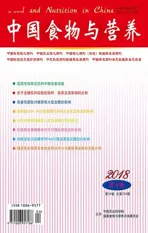关于含糖饮料征税的税种、税率及其影响的分析
2018-05-09付齐齐刘爱玲
付齐齐,刘爱玲
(中国疾病预防控制中心营养与健康所,北京 100050)
从全球来看,拉丁美洲、中东、亚洲、大洋洲、加勒比海等中低收入国家包括中国含糖饮料消费呈快速上升趋势[1-3]。国内外系统综述和Meta分析表明,过多摄入含糖饮料可增加超重肥胖、2型糖尿病和血脂异常的发病风险[4-6]。WHO指出,对含糖饮料征税是降低含糖饮料消费最主要的综合性措施[7],而一项有效税收政策的制定应考虑纳税饮料的范围、税种(销售税或消费税)以及税率[8]。目前我国关于含糖饮料征税的介绍主要集中在征税历程和征税优劣势分析方面[9-10]。因此,通过重点对含糖饮料税的税种、税率及税后影响等方面的文献资料进行归纳整理,为我国制定相关政策提供参考。
1 征税饮料种类与含糖饮料税的税种
目前,对饮料征税的国家主要包括欧洲的匈牙利、法国、英国和芬兰;拉丁美洲的墨西哥、厄瓜多尔和巴巴多斯;非洲的南非和毛里求斯;太平洋地区的斐济、萨摩亚、瑙鲁、法属波利尼西亚、库克群岛和汤加王国,另外,还包括美国的部分州和城市如缅因州、加利福尼亚伯克利、费城、美洲土著保留地(美国纳瓦霍国)[2]等。征税饮料大多为含糖饮料,但含糖饮料包含的种类不同。英国对含有添加糖的饮料征税,不包括牛奶饮料、茶和咖啡[11];墨西哥对所有含有添加糖的饮料征税,不包括纯果汁和人工添加甜味剂的饮料[12];匈牙利对含糖、含盐、含咖啡的饮料征税[13];瑙鲁(岛)对碳酸饮料、甜果汁饮料、调味奶和饮料混合物征税[14];美国伯克利对含有添加糖的非酒精饮料征税,纯果汁和水不包含在内[15](表1)。
对含糖饮料征税的税种包括消费税和销售税,英国、法国、墨西哥等大多数国家征收消费税,征收销售税的国家较少,如美国对杂货店和自动售货机苏打汽水征收销售税。销售税促使消费者购买更便宜的品牌或更大容量的饮料,对降低含糖饮料消费影响较小。消费税是对生产商和批发商进行征收,相对于销售税更容易实施,既能鼓励企业生产能量更低的产品,又因为消费税在付款之前征收,能够使消费者意识到因税收导致的价格上涨,更有利于降低含糖饮料的消费[16]。
2 含糖饮料税的税率及税后影响
对含糖饮料征税的税率包括累进税率和比例税率,不同税率种类及不同税率大小对消费量、健康影响不同。匈牙利和英国征收累进税率,墨西哥、法国、巴巴多斯等大多数国家征收比例税率。累进税率征税时考虑每100mL饮料中含糖量的阈值,超过一定阈值才进行征税;比例税率按照固定比例进行征税。累进税率设定阈值将促使生产商重新设计产品含糖量,减少能量摄入,而比例税率更容易实施[8]。
2.1 不同税率对消费量的影响
累进税率和比例税率均有利于降低含糖饮料消费量。含糖饮料征税对其消费量的影响可以通过价格弹性来估计,通常价格每增加10%可使消费量下降10%[8]。英国征收累进税率,即每100mL饮料含糖量大于8g(高糖)征收重税、5~8g(中糖)中等税、小于5g(低糖)不征税[11]。含糖饮料行业对该税有三种反应:重新设计产品、涨价、调整市场份额,模型研究发现在生产含糖饮料时将高糖饮料含糖量降低30%、中糖饮料降低15%可使每人每天减少58.5mL含糖饮料消费量[17]。
不同比例税率对消费量影响不同。在实例研究中,英国一家餐厅征税0.1英镑(约3.1%~3.8%)配合设计新产品、菜单调整等措施,发现含糖饮料消费量下降9.34%[18];墨西哥对含糖饮料征税1比索/L(约10%),发现含糖饮料消费量下降6.3%,水购买量增加16.2%[12];税率大于20%的有爱尔兰、费城、伯克利、瑙鲁,其中伯克利征税1美分/盎司发现含糖饮料消费量下降9.6%,水消费量增加15.6%[19];爱尔兰税率从23%下降到21%,软饮料消费量增加6.8%[20]。在模型研究中,墨西哥和厄瓜多尔对含糖饮料征税10%可使含糖饮料消费量分别减少40.18mL和降低12%[21-22];墨西哥和纽约征税税率在10%~20%可使含糖饮料消费量分别减少43.23mL和降低9.3%[21-23];美国征税的税率超过20%可使含糖饮料消费量降低15%[24](表1、表2)。
2.2 不同税率对健康的影响
累进税率和比例税率对健康的影响多基于模型研究,实例研究较少。在模型研究中,英国征收累进税率可使龋齿和糖尿病发生率分别降低4.4%和31.1%[17]。在实例研究中,美国和缅因州分别对苏打汽水和软饮料征收比例税率在4.25%~4.51%和5.5%时,均发现对体重影响不大[25-26]。墨西哥、美国、德国、英国、印度、南非等国家在模型研究中对含糖饮料征收比例税率在10%~20%时,发现超重患病率下降0.7%~3.0%,肥胖患病率下降幅度1.3%~6.9%不等,糖尿病发病率、患病率、死亡率分别下降1.6%[27]、13.4%[21]和1.5%[28],中风和冠心病死亡率分别下降0.1%和1.0%[28];税率大于20%,效果更明显,肥胖患病率可下降1.5%[24],糖尿病发病率和死亡率可分别下降2.6%[24]和4.1%[28],中风和冠心病死亡率可分别下降0.2%和2.8%[28](表2)。

表1 不同国家含糖饮料征税情况
注:—没有相关研究数据

表2 不同国家含糖饮料征税效果的模型研究
注:—没有相关研究数据
2.3 含糖饮料征税对就业的影响
丹麦税务部门取消开征糖税,并指出糖税会增加管理成本,造成失业增加[29]。然而,墨西哥研究发现,含糖饮料征税后期失业率有轻微上升,可以忽略不计,总的来说,对就业没有影响[30]。Lisa M.Powell等[31]发现,含糖饮料征税20%不会对加利福尼亚州和伊利诺斯州的就业产生不利影响。
2.4 含糖饮料征税对经济的影响
含糖饮料征税可降低医疗费用支出,增加财政收入。在模型研究中,厄瓜多尔对含糖饮料征收10%消费税,可增加5 800万美元财政收入[22];哥伦比亚对含糖饮料征收20%消费税可增加哥伦比亚财政年总收入的1%,节省因中风造成的4亿美元医疗费用支出[32];在美国,对含糖饮料征收1美分/盎司的税可节省171亿医疗费用支出,增加130亿财政收入[24];在澳大利亚,征税20%可节省6.09亿澳元医疗费用支出,增加4亿澳元财政收入[33]。
3 结论
目前中国缺乏对含糖饮料征税态度方面的研究,国外研究显示,大多数国家公众支持政府对含糖饮料消费进行调控。一项来自北美洲、南美洲、欧洲、亚洲、中东、非洲、大洋洲的75个国家共1 290投票结果显示,68%的投票者支持政府出面调节含糖饮料的消费量来降低肥胖负担[34]。美国和法国近50%公众支持对含糖饮料征税,并且如果税收的收入是用在医疗保健系统,公众对含糖饮料征税支持高达72.7%。美国和法国公众近一半认为含糖饮料是造成儿童肥胖的重要因素,支持税收能够改善人们健康状况[35-36]。
目前,全球已经有很多国家和城市对含糖饮料征税,税种主要为消费税,税率以比例税率为主。征税可降低含糖饮料消费,我国应加强相关研究,适时出台相关政策,并鼓励饮料企业进行营养转型。◇
[1]中国营养学会.中国居民膳食指南(2016)[M].北京:人民卫生出版社,2016.
[2]Popkin B M,Hawkes C.Sweetening of the global diet,particularly beverages:patterns,trends,and policy responses[J].Lancet Diabetes Endocrinol,2016,4(2):174-186.
[3]李冬华,于冬梅,赵丽云.中国九省成人含糖饮料消费及添加糖摄入量的趋势分析[J].卫生研究,2014,43(1):70-72.
[4]中国营养学会.食物与健康——科学证据共识[M].北京:人民卫生出版社,2016.
[5]郭海军,丁彩翠,刘爱玲.含糖饮料摄入与2型糖尿病关系的剂量反应Meta分析[J].中国慢性病预防与控制,2016,24(7):530-535.
[6]丁彩翠,郭海军,宋超,等.含糖饮料消费与肥胖及体重改变关系的Meta分析[J].中国慢性病预防与控制,2015,23(7):506-511.
[7]Taxes on sugar drinks:Why do it?Geneva:World Health Organization[EB/OL].http://apps.who.int/iris/bitstream/10665/250303/1/WHO-NMH-PND-16.5-eng.pdf?ua=1.
[8]Brownell K D,Farley T,Willett W C,et al.The public health and economic benefits of taxing sugar-sweetened beverages[J].N Engl J Med,2009,361(16):1599-1605.
[9]郑梦琪,张建芬,何海蓉,等.对我国含糖饮料征税的SWOT分析[J].中国食物与营养,2017,23(5):38-41.
[10]米玉倩,吴静,梁晓峰.国外的征收含糖饮料税对我国疾病防控的借鉴[J].中国公共卫生管理,2017(1):56-59.
[11]Jones C M.The UK sugar tax-a healthy start?[J].Br Dent J,2016,221(2):59-60.
[12]Colchero M A,Molina M,Guerrero-Lopez C M.After Mexico implemented a tax,purchases of sugar-sweetened beverages decreasedand water increased:difference by place of residence,household composition,and income level[J].J Nutr,2017,147(8):1552-1557.
[13]Bíró A.Did the junk food tax make the Hungarians eat healthier?[J].Food Policy,2015(54):107-115.
[14]Thow A M,Quested C,Juventin L,et al.Taxing soft drinks in the Pacific:implementation lessons for improving health[J].Health Promot Int,2011,26(1):55-64.
[15]Falbe J,Thompson H R,Becker C M,et al.Impact of the berkeley excise tax on sugar-sweetened beverage consumption[J].Am J Public Health,2016,106(10):1865-1871.
[16]Brownell K D,Frieden T R.Ounces of prevention—the public policy case for taxes on sugared beverages[J].N Engl J Med,2009,360(18):1805-1808.
[17]Briggs A D M,Mytton O T,Kehlbacher A,et al.Health impact assessment of the UK soft drinks industry levy:a comparative risk assessment modelling study[J].The Lancet Public Health,2017,2(1):e15-e22.
[18]Cornelsen L,et al.Change in non-alcoholic beverage sales following a 10—pence levy on sugar-sweetened beverages within a national chain of restaurants in the UK:interrupted time series analysis of a natural experiment[J].J Epidemiol Community Health,2017,71(11):1107-1112.
[19]Silver L D,Ng S W,Ryan-Ibarra S,et al.Changes in prices,sales,consumer spending,and beverage consumption one year after a tax on sugar-sweetened beverages in Berkeley,California,US:a before-and-after study[J].PLoS Med,2017,14(4):e1002283.
[20]Roy Bahl R B A M.The uneasy case against discriminatory excise taxation soft drink taxes in Ireland[J].Public Finance Review,2003,31(5):510-533.
[21]Barrientos-Gutierrez T,Zepeda-Tello R,Rodrigues E R,et al.Expected population weight and diabetes impact of the 1—peso-per-litre tax to sugar sweetened beverages in Mexico[J].PLoS One,2017,12(5):e176336.
[22]Paraje G.The effect of price and socio-economic level on the consumption of sugar-sweetened beverages(SSB):The Case of Ecuador[J].PLoS One,2016,11(3):e152260.
[23]Ruff R R,Zhen C.Estimating the effects of a calorie-based sugar-sweetened beverage tax on weight and obesity in New York City adults using dynamic loss models[J].Annals of Epidemiology,2015,25(5):350-357.
[24]Wang Y C,et al.A penny-per-ounce tax on sugar-sweetened beverages would cut health and cost burdens of diabetes[J].Health Aff(Millwood),2012,31(1):199-207.
[25]Powell L M,Chriqui J,Chaloupka F J.Associations between state-level soda taxes and adolescent body mass index[J].J Adolesc Health,2009,45(3 Suppl):S57-S63.
[26]Oaks B.An evaluation of the snack tax on the obesity rate of maine[J].2005.
[27]Basu S,Vellakkal S,Agrawal S,et al.Averting obesity and type 2 diabetes in India through sugar-sweetened beverage taxation:an economic-epidemiologic modeling study[J].PLoS Med,2014,11(1):e1001582.
[28]Penalvo J L,Cudhea F,Micha R,et al.The potential impact of food taxes and subsidies on cardiovascular disease and diabetes burden and disparities in the United States[J].BMC Med,2017,15(1):208.
[29]Stafford N.Denmark cancels “fat tax” and shelves “sugar tax” because of threat of job losses[J].BMJ,2012,345(nov211):e7889.
[30]Guerrero-López C M,et al.Employment changes associated with the introduction of taxes on sugar-sweetened beverages and nonessential energy-dense food in Mexico[J].Preventive Medicine,2017,105(Supplement):S43-S49.
[31]Powell L M,Wada R,Persky J J,et al.Employment impact of sugar-sweetened beverage taxes[J].Am J Public Health,2014,104(4):672-677.
[32]Caro J C,et al.Sugary drinks taxation,projected consumption and fiscal revenues in Colombia:evidence from a Quaids model[J].PLoS One,2017,12(12):e189026.
[33]Veerman J L,et al.The impact of a tax on sugar-sweetened beverages on health and health care costs:a modelling study[J].PLoS One,2016,11(4):e151460.
[34]Colbert J A,Adler J N.Clinical decisions.Sugar-sweetened beverages—polling results[J].N Engl J Med,2013,368(3):e4.
[35]Julia C,Mejean C,Vicari F,et al.Public perception and characteristics related to acceptance of the sugar-sweetened beverage taxation launched in France in 2012[J].Public Health Nutr,2015,18(14):2679-2688.
[36]Donaldson E A,et al.Public support for a sugar-sweetened beverage tax and pro-tax messages in a Mid-Atlantic US state[J].Public Health Nutr,2015,18(12):2263-2273.
[37]Fiscal policies for diet and prevention of noncommunicable diseases.Geneva:World Health Organization[EB/OL]http://apps.who.int/iris/bitstream/10665/250131/1/9789241511247-eng.pdf.
[38]Alvarado M,et al.Trends in beverage prices following the introduction of a tax on sugar-sweetened beverages in Barbados[J].Prev Med,2017,105S:S23-S25.
[39]Cawley J,Willage B,Frisvold D.Pass-Through of a Tax on Sugar-Sweetened Beverages at the Philadelphia International Airport[J].JAMA,2018,319(3):305-306.
[40]Stacey N,Tugendhaft A,Hofman K.Sugary beverage taxation in South Africa:household expenditure,demand system elasticities,and policy implications[J].Prev Med,2017,105S:S26-S31.
[41]Briggs A D,Mytton O T,Madden D,et al.The potential impact on obesity of a 10% tax on sugar-sweetened beverages in Ireland,an effect assessment modelling study[J].BMC Public Health,2013,13(1):860.
[42]Schwendicke F,Stolpe M.Taxing sugar-sweetened beverages:impact on overweight and obesity in Germany[J].BMC Public Health,2017,17(1):88.
[43]Manyema M,et al.The potential impact of a 20% tax on sugar-sweetened beverages on obesity in South African adults:a mathematical model[J].PLoS One,2014,9(8):e105287.
[44]Briggs A D,et al.Overall and income specific effect on prevalence of overweight and obesity of 2020% sugar sweetened drink tax in UK:econometric and comparative risk assessment modelling study[J].BMJ,2013,347(6):f6189.
[45]Nomaguchi T,et al.The impact on productivity of a hypothetical tax on sugar-sweetened beverages[J].Health Policy,2017,121(6):715-725.
